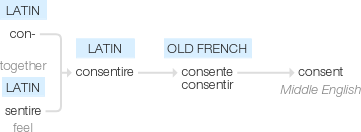Consent
Middle English: from Old French consente (noun), consentir (verb), from Latin consentire, from con- ‘together’ + sentire ‘feel’.
wiktionary
Recorded in Middle English since circa 1225, borrowed from Old French consentir, from Latin cōnsentīre, present active infinitive of cōnsentiō(“to feel together”), itself from com-(“with”) + sentiō(“to feel”)
etymonline
consent (v.)
c. 1300, "agree, give assent; yield when one has the right, power, or will to oppose," from Old French consentir "agree; comply" (12c.) and directly from Latin consentire "agree, accord," literally "feel together," from assimilated form of com "with, together" (see con-) + sentire "to feel" (see sense (n.)).
"Feeling together," hence, "agreeing, giving permission," a sense evolution that apparently took place in French before the word reached English. Related: Consented; consenting.
consent (n.)
c. 1300, "approval, voluntary acceptance of what is done or proposed," also "agreement in sentiment, unity in opinion," from Old French consente, from consentir "agree; comply," from Latin consentire "agree, accord," literally "feel together," from assimilated form of com "with, together" (see con-) + sentire"to feel" (see sense (n.) ).
In Middle English sometimes in a negative sense, "yielding (to sinful desire); connivance." Age of consent, at which one's consent to certain acts is legally valid, is attested from 1650s.
